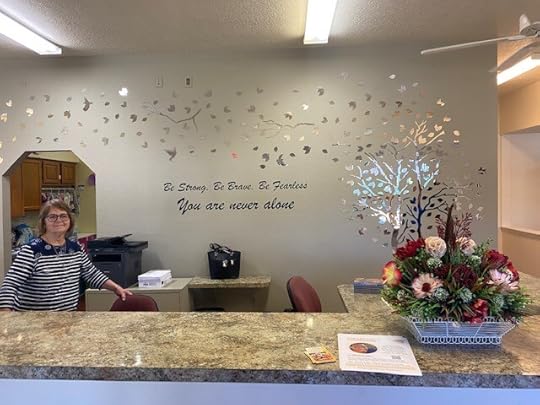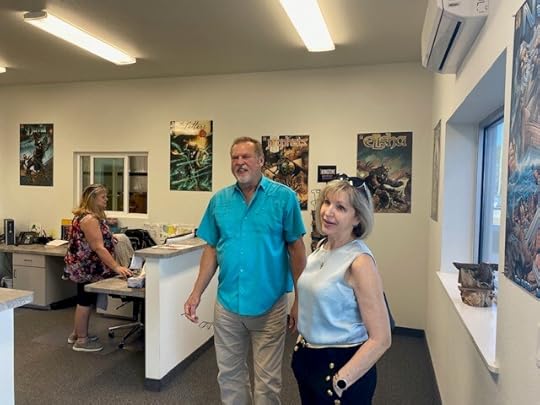Randy Alcorn's Blog, page 42
March 3, 2023
Why Is Affirming Biblical Truth Important for All of Us?

Lots of people believe everyone will go to Heaven or that Hell doesn’t exist. Where do people get these ideas?
Our theology tends to come from sources we trust. Some people, instead of trusting Scripture, believe a hodgepodge of pop psychology and pop religion, with a little New Age philosophy thrown in. And some people think they trust Scripture, but don’t bother to read and know it well enough to recognize truth (or heresy) when they see or hear it.
The fact that a teacher or blogger or even a pastor has some good insights makes their heresy all the more easy to swallow. Hand a sane person undisguised rat poison and they won’t eat it. Cover it in chocolate, and they just might. All effective heresy contains some, even much, that is true—it’s that chocolate coating that deceives us into taking a bite.
Genuine ignorance may be the reason some teach what we know to be heresy. They have no intent to deceive. Yet as James warns, “Dear brothers and sisters, not many of you should become teachers in the church, for we who teach will be judged more strictly” (3:1, NLT). God takes our words seriously, and so should we.
And there’s another reason—the most insidious, and probably the most common—for false teaching. “The Spirit clearly says that in later times some will abandon the faith and follow deceiving spirits and things taught by demons [doctrines of demons in some translations]” (1 Timothy 4:1). False doctrine is more than errant human opinion. Often its source is in another world, where evil spirits labor to deceive us. Ironically, demons know true doctrine better than we do—making them all the more effective in obscuring and twisting it: “You believe that there is one God. Good! Even the demons believe that—and shudder” (James 2:19).
Paul makes a remarkable statement in 1 Timothy 6:3-4—“If anyone teaches false doctrines and does not agree to the sound instruction of our Lord Jesus Christ and to godly teaching, he is conceited and understands nothing...”
A rather blanket condemnation, but nonetheless scriptural and quite clear. What strikes me is the first description that comes to Paul’s mind, as prompted by the Holy Spirit: teachers of false doctrines are conceited. Why? I think it’s because they choose their preferred doctrines over God’s revealed doctrines. And that is not just error, it is the ultimate conceit. That view says, “I trust my own opinions and perspectives (which are often identical to the current drift of culture) more than I trust God’s.” The false teacher earns the same condemnation as the enemy—who set himself up to be God—by following in his footsteps.
The judgment upon a false prophet is serious indeed (capital punishment in the Old Testament). The burden laid on Bible teachers in the New Testament is also heavy. Jesus said
“I tell you, on the day of judgment people will give account for every careless word they speak.” Titus 2:1 says, “You must teach what is in accord with sound doctrine.” Those are great verses to put up where we’ll see them.
Submitting to God’s revealed truth, even when we do not like its implications, and wish that it said something other than it does, takes humility. The doctrine of eternal Hell is a prime example—I do not “like” it, but I accept and submit to it, and recognize any of my instincts and arguments against it are but straw.
Jesus spoke more of Hell than anyone—who am I to suggest some way around a doctrine that Christ embraced and taught? And consider the vested interest that demons have in our not believing in it! (See Hell: Eternal Sovereign Justice Exacted upon Evildoers, which is chapter 29 of my book If God Is Good.)
If I were to join people in believing (or worse yet, teaching) “there is no eternal Hell” or “everyone will go to Heaven” I might fancy myself civilized and compassionate. But in fact, I would simply be a heretic, trusting in my insights and doctrines over my Lord’s—and hence proving that I, and the current drift of popular opinion, not He, is my real “Lord.”
March 1, 2023
The Adventures Ahead on the New Earth

At 2:30 a.m., on November 19, 2002, I stood on our deck gazing up at the night sky. Above me was the Leonid meteor shower, the finest display of celestial fireworks until the year 2096. For someone who has enjoyed meteor showers since he was a kid, this was the celestial event of a lifetime.
There was only one problem: clouds covered the Oregon sky. Of the hundreds of streaking meteors above me, I couldn’t see a single one. I felt like a blind man being told, “You’re missing the most beautiful sunset of your lifetime. You’ll never be able to see another like it.”
Was I disappointed? Sure. After searching in vain for small cracks in the cloud cover, I went inside and wrote these paragraphs. I’m disappointed, but not disillusioned. Why? Because I did not miss the celestial event of my lifetime.
My lifetime is forever. My residence will be a new universe, with far more spectacular celestial wonders, and I’ll have the ability to look through the clouds or rise above them.
During a spectacular meteor shower a few years earlier, I had stood on our deck watching a clear sky. Part of the fun was hearing oohs and aahs in the distance, from neighbors looking upward. Multiply these oohs and aahs by ten thousand times ten thousand, and it’ll suggest our thunderous response to what our Father will do in the new heavens as we look upward from the New Earth.
Imagine sitting around campfires on the New Earth, wide-eyed at the adventures recounted. Yes, I mean telling real stories around real campfires. Why not? After all, friendship, camaraderie, laughter, stories, and cozy campfires are all good gifts from God.
On the New Earth we may experience adventures that make our current mountain climbs, surfing, skydiving, and upside-down roller coaster rides seem tame. Why do I say this? It’s more than wishful thinking. It’s an argument from design. We take pleasure in exhilarating experiences not because of sin but because God wired us this way. We weren’t made to sit all day in dark rooms, watching actors pretend to live and athletes do what we can’t.
In Heaven, we will be able to do as we wish and go where we wish, never wondering if our wishes are wrong!
Want to see the crossing of the Red Sea? Want to be there when Daniel’s three friends emerge from the fiery furnace? It would be simple for God to open the door to the past. Because God is not limited by time, He may choose to show us past events as if they were presently happening. We may be able to study history from a front-row seat.
Think of friends or family members who loved Jesus and are with Him now. Picture them with you, walking together in this place. All of you have powerful bodies, stronger than those of an Olympic decathlete. You are laughing, playing, talking, and reminiscing. Now you see someone coming toward you. It’s Jesus, with a big smile on his face. You fall to your knees in worship. He pulls you up and embraces you.
At last, you’re with the person you were made for, in the place you were made for. Everywhere you go, there will be new people to meet, including Charles Spurgeon and his friends Charles Stanford and Hugh Stowell Brown. As the author of Hebrews wrote, “All these people died still believing what God had promised them. They did not receive what was promised, but they saw it all from a distance and welcomed it. They agreed that they were foreigners and nomads here on earth. Obviously people who say such things are looking forward to a country they can call their own. If they had longed for the country they came from, they could have gone back. But they were looking for a better place, a heavenly homeland. That is why God is not ashamed to be called their God, for he has prepared a city for them” (11:13-16, NLT).
There will be new places to enjoy, new things to discover. What’s that delicious aroma? A feast? A party’s ahead. And you’re invited.
Here are some further thoughts about our coming adventures on the New Earth:
In the glimpses afforded of [Jesus’] life beyond resurrection we find . . . freedoms even further enhanced. At the physical level he can appear, disappear and then reappear at will (cf. John 20:19, 26; Luke 24:15, 31, 36, 51); at the moral and spiritual level there is a freedom from the awful burden of responsibility for the completion of his mission; at the relational level there is a new freedom to indwell and personally identify with all who belong to him. Such is the promise of the heavenly life—an existence of boundless freedoms.
Bruce Milne, The Message of Heaven and Hell
We are partly “Heaven-blind” because the worldview our culture has adopted has made it hard to see supernatural colors.
Daniel Brown, What the Bible Reveals about Heaven
Their souls being on fire with holy love, shall not be like a fire pent up, but like a flame uncovered and at liberty. Their spirits, being winged with love, shall have no weight upon them to hinder their flight. There shall be no lack of strength or activity, nor any lack of words with which to praise the Object of their affection. Nothing shall hinder them from communing with God, and praising and serving Him just as their love inclines them to do.
Jonathan Edwards, Heaven: A World of Love
If it brings glory to God and increases our knowledge of Him, you will indeed be able to engage in some form of time travel.
Larry Dick, A Taste of Heaven
We want to serve God more, but we have to sleep. We want to pray and study the Bible, but we grow weary. In Heaven, bodies will do whatever we want them to do. We will possess boundless energy with which to serve God.
Steven J. Lawson, Heaven Help Us!
Actually, we will do many of the same things in Heaven that we did here on the earth—just perfectly.
Steven J. Lawson, Heaven Help Us!
This voice of joy [in Heaven] is not like our old complaints, our impatient groans and sighs; nor this melodious praise like the scoffs and revilings, or the oaths and curses which we heard on earth. This body is not like that we had, nor this soul like the soul we had, nor this life like the life we lived. We have changed our place and state, our clothes and thoughts, our looks, language and company.
Before, a saint was weak and despised; so proud and peevish we could often scarce discern his graces; but now, how glorious is a saint! …Happy union! Now the Gospel shall no more be dishonored through our folly.
Richard Baxter, The Saints’ Everlasting Rest
I haven’t been cheated out of being a complete person—I’m just going through a forty-year delay, and God is with me even through that. Being “glorified”—I know the meaning of that now. It’s the time, after my death here, when I’ll be on my feet dancing.
Joni Eareckson Tada
If Jesus’ resurrected body is a clue, along with accounts of angels appearing to a host of other biblical worthies, I surmise that we will transport ourselves not only across but also through space—and with what by earth standards would seem incredible speed. Anyone who has envied a hawk’s ability to soar or a whale’s to dive can get enthusiastic about heavenly release from present limitations of mobility.
Arthur Roberts, Exploring Heaven
These small and perishable bodies we now have were given to us as ponies are given to schoolboys. We must learn to manage: not that we may some day be free of horses altogether but that some day we may ride bare-back, confident and rejoicing, those greater mounts, those winged, shining and world-shaking horses which perhaps even now expect us with impatience, pawing and snorting in the King’s stables. Not that the gallop would be of any value unless it were a gallop with the King; but how else—since He has retained His own charger— should we accompany Him?
C. S. Lewis, Miracles
We shall not cease from exploration
And the end of all our exploring
Will be to arrive where we started
And know the place for the first time.
T. S. Eliot, “Little Gidding”
Throughout eternity we will live full, truly human lives, exploring and managing God’s creation to his glory. Fascinating vistas will unfold before us as we learn to serve God in a renewed universe.
Edward Donnelly, Biblical Teaching on the Doctrines of Heaven and Hell
There will be new planets to develop, new principles to discover, new joys to experience. Every moment of eternity will be an adventure of discovery.
Ray C. Stedman, “The City of Glory”
Browse more resources on the topic of Heaven, and see Randy’s related books, including Heaven .
Photo by Tom Gainor on Unsplash
February 27, 2023
The Four Biggest Assets in My Grief

Grieving a loved one’s death is a long, often lonely, always painful process. Four key players stand out in my continued healing journey through grief.
First is my firm belief in the promises of Jesus about our eternal future. They are blood-bought, meaning our resurrection is guaranteed. Nanci and I spent so much time talking about the world to come, and she would walk me through her afterlife bucket list. We would talk of adventures together on God’s New Earth that are all still ahead of us. So though her death is a heartbreaking interruption, we can both anticipate the everlasting reunion in a world without sin and suffering and grief, where happiness will be the air we breathe.
Secondly, I cherish my friendship with God. I have frequently pondered with astonishment in the last year Jesus’s words in John 15:15: “I no longer call you servants, because a servant does not know his master’s business. Instead, I have called you friends, for everything that I learned from my Father I have made known to you” (NIV).
Jesus is my closest and dearest friend. He was and is Nanci’s closest friend. Jesus was closer to Nanci than I ever was, and He is closer to me than she ever was. He’s the only being in the universe that is true love. And He is with me on this present earth, and He is with her in Heaven; so that means she is with Him, and I am with Him. That certainty closes what would otherwise seem a huge distance between Nanci and me now. Jesus is the bridge that keeps us connected until we live in that new world, with new bodies and minds, that He is preparing for us. The connection I feel to her through Him is profound.
Jesus promised, “I am with you always, even to the end of the age” (Matthew 28:20). And in Hebrews we’re promised “Never will I leave you; never will I forsake you” (13:5). Two of the three members of the triune God—Son and Spirit—indwell us! And He invites us to “Cast all your anxiety on him because he cares for you” (1 Peter 5:7). These promises mean that no matter how we may feel, we are not abandoned or unloved.
Thirdly—and these are not in order, or my dog wouldn’t come before family and friends—but one of the great blessings since Nanci went to be with Jesus has been our dog Gracie, who we picked out together. When I’m not traveling she is my constant companion. Every day we run together, and her sheer excitement and delight as she dramatically pulls her leash forward makes me laugh hard and run faster than I otherwise would. Romans 1:20 says, “For since the creation of the world God’s invisible qualities—his eternal power and divine nature—have been clearly seen, being understood from what has been made.” Animals are the second most important part of God’s creation, after people. We should see God’s nature in His creation.

Gracie is, of course, not God; she is secondary, part of His creation, but she points me to the primary, who is God alone. She snuggles with me, sending a message of love and affection. When I let her outside she runs around the yard crazily. When I give her one of a variety of healthy treats, she darts and jumps and is overcome with exuberance from the moment she hears the bag open. She then charges off to her favorite spot in the living room and relishes her treat for ten seconds before eating it. Her body languages declares, “I am surely the world’s most fortunate creature.” It is nearly impossible for me to be unhappy in her presence.

Fourthly, I’ve found a great deal of comfort in my family, church, small group, and close circle of friends. Paul instructed the Galatians to “Share each other’s burdens, and in this way obey the law of Christ” (6:2).
Our daughters have been wonderful to me, and have helped me in both physical and spiritual ways. They have called and checked in and made themselves available to help. Karina, who lives 1,000 miles away, has done a lot to organize and simplify our finances—everything from autopay to paperless billing to helping with taxes. Angela has often picked up groceries for me and dropped by meals and helped around the house. I consider our sons in law, “the Dans,” to be good friends, and I am encouraged by their wonderful care for my daughters and grandchildren. My grandsons have helped me mostly by just being who they are and sharing their lives with me when I’m at their homes and games, and by Facetime, videos, and texts. We are soon going to all gather for six days, the middle of which falls on the one-year anniversary of Nanci’s going to be with Jesus. I just can’t wait for all of us to be together!

Regarding our church, as I said at Nanci‘s memorial service, with all the people who hate the church these days and have terrible stories about church people, I can never resent the church but only appreciate it because of what I witnessed in the last years and months of Nanci’s life. People brought meals, prayed, visited her, massaged her hands and feet, and spent the night at our house to help care for her. I can only love the church because of what it has done for my dear wife. I saw the same kind of care for my mother when she was dying in 1981. I have never forgotten the four nurses from our church who were with her nearly day and night.
Our little group of three couples—Steve and Sue Keels, Paul and Michele Norquist, Nanci and I—ate together at the Keels’ house nearly every Thursday for twenty-some years, enjoying Sue’s wonderful meals. In the last three years we’ve shared many tears, after Jason, Steve and Sue’s son, died the day after Thanksgiving in 2019. Then Michele died January 1, 2022, and Nanci on March 28, 2022. Sue still fixes dinner for Paul, Steve, and me on Thursdays, though the six of us have been reduced to four. To show how this small circle connects with suffering, loss, and grief, consider that of the four of us still here, two have lost their son, and the other two have lost our wives.

If you don’t have them, take the initiative to make those kinds of friends. Hold on to them. Live beside them. Walk the valley of the shadow of death with them. We need each other. I thank God for my church, my family, my friends, my small group, for Him, and for His promises which guarantee I’ll never walk that valley alone.

I began this blog by talking about God and want to end it that way. What follows are the words of my wife Nanci which she wrote in her journal after meditating on Psalm 23. I recommend reading the Scripture first, since all she prays is prompted by it:
Please, Shepherd of My Life,
Cause me to want nothing more—not even good health—than to have you as my Shepherd.
Reveal to me that the pastures and waters to which you lead me are green and still—because you are there!
Engage my heart to receive the restoration of my soul by your Holy Spirit.
Renew my conviction that, for your name’s sake, righteousness is the direction of each path you have for me.
May your Holy Spirit—the Comforter—banish all my fears of evil (being out of control, letting pride inflate me, weakness, pain, loss of plans) as I walk through this valley—because you are with me!
Open my eyes and my ears to the protection and comfort of your rod and staff. Don’t let me miss those things and people which you have provided me for this purpose.
Help me experience the table you have prepared for me in the presence of this cancer.
Don’t let me overlook—or fail to ask for—your every healing drop of oil on my head.
Keep my perspective on my daily overflowing cup of your goodness and mercy.
Direct my longing toward my place in your house, forever!
Photo by Jeff Hopper on Unsplash
February 24, 2023
God’s Word and the Universal Problem of Suffering

“What is the meaning of it, Watson?” said Holmes solemnly as he laid down the paper. “What object is served by this circle of misery and violence and fear? It must tend to some end, or else our universe is ruled by chance, which is unthinkable. But what end? There is the great standing perennial problem to which human reason is as far from an answer as ever.” (Sir Arthur Conan Doyle, “The Adventure of the Cardboard Box”)
Sherlock Holmes so succinctly put the question that every human who’s ever suffered asks. What, after all, is more universal to human experience than suffering? And what is more important than the perspective we bring to it?
I came to know my friend Jim Harrell after he read my book Heaven. We talked on the phone, exchanged e-mails, and quickly connected at a heart level. Jim, a successful businessman, strong and athletic for most of his life, contracted ALS, Lou Gehrig’s disease, in 2003. Yet he called the last six years of his life the most significant. In his last dictated e-mail, he told me he now had no ability to move from his neck downward. While his body deteriorated and he’d lost normal functions, one after another, Jim touched more people (and was touched more by God) than at any other time of his life.
While writing my book If God Is Good, Faith in the Midst of Suffering and Evil, I drew on Jim’s wisdom, as well as that of many other sufferers.
During the two years it took me to research and write the book, many people asked about the project. I expected that my answer, containing the words evil and suffering, would prompt a quick change of subject. Most, however, expressed keen interest and asked penetrating questions. Several launched into their own stories, as if having received permission to uncork the bottle.
How we answer the central question of why, if God is good, do we suffer, will radically affect how we see God and the world around us.
We may want to turn away from world suffering and refuse to reflect on the significance of our own pain; we just want it to go away. But despite the superficiality of our culture, we remain God’s image-bearers—thinking and caring people, wired to ask questions and seek answers.
If God loves us, how can He justify allowing (or sending) the sometimes overwhelming difficulties we face?
While traveling the long road of researching and writing If God Is Good, I found something surprising: the journey was not only rewarding, but fascinating, enlightening, and at times downright enjoyable. I know it sounds counterintuitive—shouldn’t it depress someone to meditate on evil and suffering? In fact, I’d already seen enough evil and suffering to feel deeply troubled. What I needed was perspective. Instead of being disheartened, I was encouraged. In fact, I was astonished at how much insight Scripture offers.
In looking for answers to why we suffer, I beheld a God who says, “I have indeed seen the misery of my people in Egypt. I have heard them crying out because of their slave drivers, and I am concerned about their suffering” (Exodus 3:7). I found great comfort in hearing God speak of a time when He could bear His people’s misery no longer (see Judges 10:16). I revel in God’s emphatic promise that He will make a New Earth where He will come down to live with us, and on which “he will wipe every tear from their eyes. There will be no more death or mourning or crying or pain” (Revelation 21:4). Above all, I’ve seen Jesus.
In his book Deserted by God? Sinclair B. Ferguson tells the story of the first physician to die of the AIDS virus in the United Kingdom. A young Christian, he contracted the disease while conducting medical research in Zimbabwe. In the last days of his life, he struggled to express himself to his wife. Near the end, he couldn’t talk, and had only enough strength to write the letter J. She ran through her mental dictionary, saying various words beginning with J. None was right. Finally she said, “Jesus?”
He nodded. Yes, Jesus.
Jesus filled his thoughts. That’s all he wanted to say. That’s all his wife needed to hear.
Seeking answers to the question of evil and suffering should turn us toward Jesus in a fresh way.
In my research and writing, and later in my journey with Nanci through fighting cancer and grieving her eventual death, my thoughts too kept coming back to Jesus. What better place?
Often God has wiped away my own tears as I’ve contemplated—and lived—potentially faith-jarring situations. I’ve been left, not in despair, but with great hope that defies description and a peace that transcends understanding (see Philippians 4:7).
This journey has stretched my trust in God and His purposes, and I have emerged better prepared to face suffering and help others because of it. I feel I have much more to offer believers in Christ who may be questioning their faith, as well as unbelievers who consider the problem of evil and suffering their single greatest obstacle to faith (see 2 Corinthians 1:3-4).
We each bring our own burdens on the journey.
If abuse, rape, desertion, paralysis, debilitating disease, or the loss of a loved one has devastated you, then this issue isn’t theoretical, philosophical, or theological. It’s deeply personal. Logical arguments won’t satisfy you; in fact, they might offend you. You need help with the emotional problem of evil, not merely the logical problem of evil.
And remember: you are a whole person, and the path to your heart travels through your mind. Truth matters. To touch us at the heart level—and to keep touching us over days, months, years, and decades—truth must work its way into our minds.
By all means, speak with a friend and perhaps a pastor or counselor. But in the process don’t seek comfort by ignoring truth. When you try to soothe your feelings without bothering to think deeply about ideas, you are asking to be manipulated. Quick-fix feelings won’t sustain you over the long haul. On the other hand, deeply rooted beliefs—specifically a worldview grounded in Scripture—will allow you to persevere and hold on to a faith built on the solid rock of God’s truth.
In writing His magnificent story of redemption, God has revealed truths about Himself, us, the world, goodness, evil, suffering, and Heaven and Hell. Those truths God reveals to us teem with life. The blood of man and God flows through them. God speaks with passion, not indifference; He utters fascinating words, not dull ones. To come to grips with the problem of evil and suffering, you must do more than hear heart-wrenching stories about suffering people. You must hear God’s truth to help you interpret those stories.
Maybe you’re holding on to years of bitterness and depression. You blame someone for your suffering—and that someone may be God. You will not find relief unless you gain perspective.
Or perhaps you fear that any attempt to “gain perspective” will deny or minimize your suffering, or that of others. The Bible never minimizes suffering or glosses over it.
At times, each of us must snuggle into our Father’s arms, like children, and there receive the comfort we need. In When God Weeps, Joni Eareckson Tada and Steve Estes write,
God, like a father, doesn’t just give advice. He gives himself. He becomes the husband to the grieving widow (Isaiah 54:5). He becomes the comforter to the barren woman (Isaiah 54:1). He becomes the father of the orphaned (Psalm 10:14). He becomes the bridegroom to the single person (Isaiah 62:5). He is the healer to the sick (Exodus 15:26). He is the wonderful counselor to the confused and depressed (Isaiah 9:6).
The faith that can’t be shaken is the faith that has been shaken.
God tells us that trials in which evil and suffering come upon us “have come so that your faith—of greater worth than gold, which perishes even though refined by fire—may be proved genuine and may result in praise, glory and honor when Jesus Christ is revealed” (1 Peter 1:7).
In her book Treasures for Women Who Hope, Alice Gray writes of sitting at a restaurant, talking with a friend about painful challenges in their lives. They frequently mentioned the Lord.
Alice noticed a young woman at the next table with a radiant, joyful face. The young woman smiled and said she’d overheard their conversation. Speaking softly, she encouraged Alice and Marlene that God understood and cared about their heartaches, and nothing could separate them from God’s love.
Alice continued talking with Marlene but realized something was different. The young woman’s words had refreshed them. When the smiling woman got up to leave, Alice saw that she wore bulky shoes, carried a walking stick, and moved with a severe limp.
The waitress told Alice this woman had been in a near-fatal automobile accident the year before. She’d been in and out of the hospital and rehabilitation. Her husband divorced her, their home had been sold, and she’d just moved into her own apartment. She used public transportation because she couldn’t drive. She’d been unable to find a job.
Alice sat stunned. She said, “This young woman’s conversation had been filled with delights of the Lord. There had been no weariness about her. She had encouraged us with words of praise and promise. Meeting her that day, we never would have suspected that storms were raging in her life. Even as she stepped outside into the cold winter wind, she seemed to carry God’s warm shelter of hope with her.”
In times of crisis we try to make sense of life. We crave perspective for our minds and relief for our hearts. We need our worldview realigned by God’s inspired Word: “All Scripture is God-breathed and is useful for teaching, rebuking, correcting and training in righteousness” (2 Timothy 3:16). God promises that His Word “will not return to me empty, but will accomplish what I desire and achieve the purpose for which I sent it” (Isaiah 55:11). God never makes such a promise about my words or your words.
So, regardless of the difficulties you face, God’s Word offers profound, moving, and surprising insights that can feed your mind, warm your heart, and give you the strength to face a world that is not what it once was, while we all await what it one day will be.
This article was excerpted from Randy’s book If God Is Good. Also see the devotional 90 Days of God’s Goodness, book The Goodness of God, and booklet If God Is Good, Why Do We Hurt?, which deals with the question and shares the gospel so that both unbelievers and believers can benefit.
Photo by Priscilla Du Preez on Unsplash
February 22, 2023
Preparing for Eternity, Anticipating Heaven, Happiness in Jesus: My Q&A at First Baptist Leesburg

Earlier this month, I visited First Baptist of Leesburg, Florida and spoke at their weekend services on the subject of my book The Treasure Principle (I’ll share the video of that message in a separate blog soon).
I absolutely loved being there at this church. I spent a lot of time with Pastor Cliff and his wife Suzy—such wonderful people, as are so many others I met. The ministries on that church campus are remarkable. I visited their pregnancy care center and met the women who work there, as well as the people in the men’s and women’s rehab and other ministries.
These pictures are from the pregnancy resource center:



The women's rehab center:


The men's rehab center:


An amazing place. The movie No Vacancy tells the true story of the church taking funds that have been allotted for a new building and using them instead to buy a rundown motel next to the church property, and convert it into housing to get women and children off the streets. I met some of the people there, and it was very touching.
This short video is from Dean Cain, one of the lead actors in the No Vacancy movie. (Years ago he was in the Superman series Lois and Clark.)
Here are some pictures of Samaritan Inn:




I was also able to reunite with my friends Art and Kelly Ayris, who founded the wonderful comic book/graphic novel publisher Kingstone, which publishes both my graphic novels Eternity and The Apostle. Art is also on the staff of First Baptist Leesburg.



During that weekend, I did an evening Q&A with Pastor Cliff, and we covered a range of topics and questions:
Will we still enjoy/dislike the same things in Heaven?
How do you prepare yourself for death? What did I learn through Nanci’s example?
Will we know our loved ones in Heaven?
What did I learn about marriage in eternity while writing Heaven ?
What about the end times? Where should our focus and emphasis be?
From what I learned writing Happiness, can Christians be happy, or should we only be joyful?
What is my approach to the problem of evil and suffering in my book If God Is Good ?
Why did I write hand in Hand , about God’s sovereignty and meaningful personal choice?
How did I get involved with prolife work?
February 20, 2023
How Accessible Will Jesus Be to Each of Us on the New Earth?

When I taught a theology of Heaven class, I was asked, “How accessible will Jesus be to us on the New Earth?” Here’s the video of my answer, and below is an edited transcript, with some added thoughts:
If indeed Jesus is the eternally incarnate son of God and still has His resurrection body, doesn’t that mean He can only be at one place at one time on Earth? When Jesus was in Caesarea Philippi, He was not also in Jerusalem healing the multitudes. He was in one place at one time. That’s part of His humanness. Will it be that same way on the New Earth? I don’t know.
God the Father: everywhere present. The Holy Spirit: everywhere present. Now, is it possible that God the Son will elect for eternity to restrict His attributes as He did while on Earth: still 100% God but choosing not to use His omnipresence.
On the one hand, Jesus is forever incarnate, and humans are finite and limited to one location. On the other hand, Jesus is God, and God is infinite and omnipresent. In a sense, then, one of these truths has to yield somewhat to the other. Perhaps Christ’s humanity defined the extent of His presence in His first coming and life on Earth (humanity thereby eclipsing deity by limiting omnipresence). But Christ’s deity may well define the extent of His presence in His second coming and life on the New Earth (deity thereby eclipsing the normal human inability to be in two places at once). Jesus has and always will have a single resurrected body, in keeping with His humanity. Yet that body glorified may allow Him a far greater expression of His divine attributes than during His life and ministry here on Earth.
Jesus may choose to limit His omnipresence. Or would His omnipresence be manifested in a physical presence in a multitude of places, unlike when He was restricted on Earth to one place? If God took on human form any number of times, as recorded in Scripture, couldn’t Christ choose to take on a form to manifest Himself to us at a distant place? If He did that, might He not take on a temporary form very similar in appearance to His actual physical form, which may at that moment be sitting on the throne in the New Jerusalem? Might Jesus appear to us and walk with us in a temporary but tangible form that is an expression of His real body? Or might the one body of Jesus be simultaneously present with His people in a million places?
Might we walk with Jesus (not just spiritually, but also physically) while millions of others are also walking with Him? Might we not be able to touch His hand or embrace Him or spend a long afternoon privately conversing with Him—not just with His spirit, but His whole person?
Well, that’s possible, though it seems a little bizarre: So, you’re walking along, having a conversation with Jesus, and you look over and there’s your friend also having a conversation with Jesus!
It may defy our logic, but God is capable of doing far more than we imagine. Being with Christ is the very heart of Heaven, so we should be confident that we will have unhindered access to Him.
Since we can accurately say that Jesus’ functioning as a man does not prohibit Him from being God, we must also say that Jesus’ functioning as God does not prohibit Him from being a man. So, although we cannot conceive exactly how it could happen, I believe it’s entirely possible that Jesus could in the future remain a man while fully exercising the attributes of God, including, at least in some sense, omnipresence.
On the New Earth, isn’t it likely we might regularly hear Him speak to us directly as He dwells in and with us, wherever we are? Prayer might be an unhindered two-way conversation, whether we are hundreds of miles away in another part of the New Jerusalem, thousands of miles away on another part of the New Earth, or thousands of light years away in the new universe. We just don’t know—there’s no way to know…yet.
This is what I do know: God will be 100% available to us. We’re told “right now” we can crawl up into His lap, so to speak, and say Abba! Father! Papa! Daddy!
We can come boldly before the throne of grace. He wants us to. He wants us to be with Him. We now have the indwelling Holy Spirit of God and we’re also told, “…Christ in you, the hope of glory” (Colossians 1:27). Well, how can Christ be in me right now while He’s in His resurrected body at the right hand of God? That would be a clear example of Him exercising a sort of omnipresence. Even if He’s not physically here in my heart, He is actually here in my heart, and in your heart and in all the places we go and in all the people in the world who know Him. That suggests omnipresence.
For more on the subject of Heaven, see Randy’s book Heaven . You can also browse additional resources on Heaven.
Photo by asap rocky on Unsplash
February 17, 2023
A Prodigal Son Finally Comes Home

Several years ago I shared on my blog about Christopher Yuan’s story of God’s grace, and his deliverance from homosexual sin. I got to meet him, and his parents Leon and Angelia Yuan, when we were both speaking in 2017 at an apologetics conference, and greatly enjoyed having breakfast with Christopher and hearing his testimony.
Here’s a brief synopsis of his story: Christopher once lived as an openly gay young man. But after being sentenced for drug dealing and finding he had HIV, he had a powerful conversion experience through reading the Bible in prison. He was not transformed into someone with heterosexual desires, but after growing as a Christian and searching God’s Word, he concluded that he could not follow Christ while submitting his thoughts and actions to same-sex desires. A serious and careful student of God’s Word, Christopher has been a professor at Moody Bible Institute.
Christopher and Angela, his mom, have written a fine book together, Out of a Far Country: A Gay Son's Journey to God. A Broken Mother's Search for Hope. He also wrote Holy Sexuality and the Gospel: Sex, Desire, and Relationships Shaped by God’s Grand Story, which is on the shortlist of most important books I’ve read in the last decade. Both book and author are Jesus-centered and Gospel-centered, full of grace and truth.
Christopher posted on Twitter on February 15: “Today marks 22 years since I walked out of prison and my parents drove me to the halfway house in Chicago. Praise God for His faithfulness!”
The audio in this video was recorded on the 12th anniversary of his release from prison. This is so touching.
“But while he was still a long way off, his father saw him and felt compassion for him, and ran and embraced him and kissed him” (Luke 15:20).
February 15, 2023
Is It God’s Will to Always Heal Us?

A writer friend was at an event many years ago when he witnessed the following: He was standing near a woman confined to a wheelchair. Suddenly a well-known woman, who had written and spoken extensively about her gift of healing, marched up to the lady in the wheelchair, dramatically laid hands on her head, and prayed loudly that God would heal her, claiming God’s promises to do so.
The healer’s entourage enthusiastically agreed with the prayer, some praying in tongues. After this went on for a while, finally they backed away, and the celebrity went on to the next interview, book signing, or healing.
God has shaped this woman in the wheelchair into the image of Christ and used her mightily through her disability. When the crowd dispersed someone asked her, “Did you feel anything happen?” My friend says he heard her answer: “Yes. My neck really hurts because she pushed down on my head so hard.”
The dear sister continues to love and serve Christ faithfully from her wheelchair.
I have seen God heal miraculously. I have also seen so-called healings which “didn’t last” the next hour or day or week, and therefore, in my opinion, were not true healings. And the “healer,” who loudly and without invitation to do so claimed her healing, either has or soon will succumb to the ultimate health problem: death.
What Does the Bible Say About Healing?
In John 9:2, Christ’s disciples revealed their false assumptions when they asked “Rabbi, who sinned, this man or his parents, that he was born blind?”
Jesus responded by saying their presupposition was entirely wrong: “Neither this man nor his parents sinned, but this happened so that the work of God might be displayed in his life” (John 9:3). In other words, God had a higher purpose for this man’s adversity that simply didn’t fit in the neat little boxes of “Do good (or have faith) and you’ll be well off” and “Do bad (or don’t have enough faith) and you won’t be.”
Jesus said of His Father in Heaven, “He causes his sun to rise on the evil and the good, and sends rain on the righteous and the unrighteous” (Matthew 5:45). In other words, God extends His common grace to all. The air breathed by every man, sinner, or saint is God’s gift, regardless of the man’s morality. Likewise suffering may be equally distributed among the righteous and unrighteous—but God will use it for the good of the righteous, and likely the unrighteous too, drawing them to Him, should they respond in faith.
Adversity Theology
In verses you will never see embroidered, or framed or posted on refrigerators, the King promised persecution, betrayal, flogging, and the opportunity to being dragged before courts and tried for our faith (Matthew 10:16-20). He warned, “In this world you will have trouble” (John 16:33), and said, “Any of you who does not give up everything sometimes our health, sometimes our life) he has cannot be my disciple” (Luke 14:33).
In Philippians, written from a prison—not a plush office or the Rome Hilton—Paul said, “It has been granted to you on behalf of Christ not only to believe on him, but also to suffer for him” (1:29). He then depicted Christ as the suffering Servant, whose ultimate prosperity came after His life on this earth, not during it (Philippians 2). Indeed, had Jesus laid claim to prosperity in this life, there would have been no crucifixion, no atonement, no gospel, and no hope for any of us.
Paul described his daily adversity, his persecution for Christ, and his nearness to death (2 Corinthians 4:7-12). Two chapters later he refers to his troubles, hardships, distresses, beatings, imprisonments, riots, sleepless nights, and hunger, as well as the experience of nearly dying, and being sorrowful and poor (2 Corinthians 6:3-10).
He seems to be making a strong case for “adversity theology,” or the “sickness and poverty gospel.” I wonder if in his dreams the apostle ever heard a faint chorus of voices from the far future saying, “Paul, you don’t have to live like this—why don’t you trust God, have faith, claim prosperity and healing, and live a king’s kid?”
Paul explained that God had given him some spiritual privileges, including special revelations. Then he said:
“To keep me from being conceited . . . there was given me a thorn in the flesh, a messenger of Satan, to torment me. Three times I pleaded with the Lord to take it away from me. But he said to me, ‘My grace is sufficient for you, for my power is made perfect in weakness.’ Therefore I will boast all the more gladly about my weaknesses, so that Christ’s power may rest on me. That is why, for Christ’s sake, I delight in weaknesses, in insults, in hardships, in persecutions, in difficulties. For when I am weak, then I am strong” (2 Corinthians 12:7-10).
First, Paul said he knew God had a definite purpose in his illness or disability. We don’t know what the disease was, but among other things it apparently involved his deteriorating eyesight. His affliction, Paul said, was “given” to him in order to keep him from being conceited.
Second, God had a specific purpose for not removing the disease—to teach Paul that His grace alone was sufficient. Paul was not to trust in his own strength but in God’s. His disease was a day-by-day reminder of his need to trust in Yahweh rather than his own gifts, accomplishments, or privileged position.
God Wants Your Heart More than Your Health
In our area, most of the health and prosperity broadcasts are on the Christian station, especially on Saturdays. A Christian doctor sponsors a frequently run ad on this station, always signing off with “Helping you get well is all that matters.” Well, actually, it isn’t—there’s a great deal that matters a great deal more. God will make us well in the resurrection, but between now and then He uses adversity, including not being well, to accomplish much in us.
Though I thank God that I can still play tennis and be in the ocean for hours and go on long bike rides, I have seen God accomplish greater things through my sickness than through my health. (I do believe in and try to practice eating right and exercising. That’s just good stewardship. What I’m opposing is the belief that it’s never God’s will for us to be sick or have a disease, and it’s always God’s will for us to be healed of it.)
Instead of assuming God wants us healthy, we need to realize that He may accomplish higher purposes through our sickness rather than our health. We may certainly pray for health and pray for healing when we are sick, which is exactly what Paul did. (And I’m all for and have been part of anointing with oil and praying as James said; I’ve seen God choose to heal and not heal when this is done.)
But notice Paul prayed only three times. When God chose not to heal him, he did not “name it and claim it” and demand that God heal him. Instead, Paul acknowledged God’s spiritual purpose in his adversity.
Health and wealth preachers bypass the rest of this passage and say, “Look, Paul called this disease a ‘messenger of Satan.’ It’s from the devil, not God. The devil wants us sick, but God wants us well.”
Paul DID call the ailment a messenger of Satan. But God is bigger than all beings and sovereign over all wills, and Satan is just one more agent He can use to accomplish His own purpose. After all, whose purpose and plan does the passage talk about? It wasn’t Satan, but God whom Paul saw as the ultimate giver of the disease, for Satan would never give anyone something to keep him from being conceited (the stated purpose of the disease).
And it was not Satan, but God, who refused to remove the disease despite Paul’s pleadings.
So if you have prayed for healing and not received it, take heart—you are in good company... with the apostle Paul!
Not only was Paul not healed, but he had to leave Trophimus in Miletus because of sickness (2 Timothy 4:20). His beloved friend Epaphroditus was gravely ill (Philippians 2:24-30). His son in the faith, Timothy, had frequent stomach disorders, concerning which Paul didn’t tell him to “claim healing” but to drink a little wine for medicinal purposes (1 Timothy 5:23).
Paul was surrounded by sick people. Those who claim “anyone with enough faith can be healed” either have more faith than the apostle Paul, or less understanding of God and His ways.
Paul, like many of God’s servants in the early church, was neither healthy nor wealthy, and it is clear that God did not intend for him to be healthy or wealthy. Of course, Paul is now enjoying perfect health and wealth for all eternity. But to prepare him for his eternal reward, when he was on this earth, it was God’s higher plan that for much of his life he not have either.
We are right to believe God promises blessing to His followers, and we are right to believe He will ultimately bring us prosperity and blessing. But the great majority of it will come after death, and in the resurrection, and on the New Earth. Expecting or demanding it here and now, in the form we want it (health and prosperity and relational bliss) is not grounded in Scripture.
I think about this when the faith healers quietly die of cancer after decades of telling everyone it is God’s will that they be healed.
Do You Know Any Ancient Faith Healers?
If it is always God’s will to heal, we should have people of faith walking this planet that are hundreds or thousands of years old. (Certainly we should have thousands of faith healers whose ministries are going on century after century.)
The basic problem with the health-and-wealth gospel is that it is man-centered rather than God-centered. When approached from the prosperity posture, prayer degenerates into coercion, where we “name it and claim it,” pulling God’s leash until He comes through. We attempt to arm-twist the Almighty into underwriting comfortable, suffering-free lifestyles.
“Faith” becomes a crowbar to break down the door of God’s reluctance, rather than a humble attempt to lay hold of his willingness. In health and wealth theology, God is seen as a great no-lose lottery in the sky, a cosmic slot machine in which you put in a coin and pull the lever, then stick out your hat and catch the winnings while your “casino buddies” (in this case, fellow Christians) whoop and holler (or say “Amen”) and wait their turn in line.
In this sort of system, God’s reason for existing is to give us what we want. If we had no needs, God would probably just disappear—after all, what purpose would He have anymore? To revise the Westminster Confession, “The chief end of God is to give humans whatever they want, and to serve them forever.”
Our Father (in Heaven) Knows Best
A well-dressed businessman once asked me, “You mentioned that you are an insulin-dependent diabetic. I’m curious—why haven’t you asked God to heal you?”
I told him, “I have. But after the first year, I stopped asking.”
He seemed stunned that I would say such a thing. “Why?” he asked.
I said, “Paul stopped praying for healing after three times. He said God clearly had a spiritual purpose in his disease. God also made that clear to me twenty years ago. And it’s just as clear to me now as it was then.”
In fact, the two greatest things God has done to cause spiritual growth in my life are 1) in 1985, getting a serious disease; and 2) in 1990, being sued for millions of dollars by an abortion clinic, forcing me to resign from a pastoral ministry I loved.
This disease set in exactly the same month my first book came out, in 1985. Coincidence? I think not. And it was the abortion clinic lawsuit that freed me to invest far more hours in writing than I ever could have when I was a pastor.
In both cases, many Christians have assured me that if I only had enough faith, God would remove both the disease and the lawsuits (and the judgments that came out of the lawsuits).
I asked God to make me more Christlike. In answer, He sent these two things (and others) to help me become more Christlike.
Should I insist that He remove the very things He sent (arguably in answer to my prayers) to make me more like Jesus, and use me for His glory, and prepare me for eternal fellowship with Him and His people?
I don’t think so.
Any time we insist God do a particular thing, including answering a certain question or defending His justice, we might want to look up “God” in the dictionary to remind ourselves who we’re attempting to hold accountable to us. Instead let’s be like Job and say, “So I am ashamed of all I have said and repent in dust and ashes” (Job 42:6, GNT). Or, better yet, like Jesus, say, “Father, if you are willing, please take this cup of suffering away from me. Yet I want your will to be done, not mine” (Luke 22:42, NLT).
For more information on this subject, see Randy Alcorn's book If God Is Good…
Photo by National Cancer Institute on Unsplash
February 13, 2023
What Is the Good Life?

As we start a new year, it’s common to ponder where we’ve been and where we’re headed. It’s also a very good idea to take a long look at who we’ve become and line it up with who God says we should be. If you dream of living the “good life” I urge you to put checking your definition against Scripture at the top of your goals this year.
Socrates said, “Not life, but a good life, is to be chiefly valued.”
And Scripture says, “The good life is reserved for the person who fears God, who lives reverently in his presence” (Ecclesiastes 8:12, MSG).
Are you living the good life?
People define the good life in different ways, but everybody wants to live it. After all, what’s the alternative? Living a bad life? A pointless, guilt-ridden, or miserable life?
We’d all choose the good life any day, and yet we often don’t understand how to make it happen.
A quick online search reveals that most people’s idea of the good life includes happiness. That makes sense—nobody wants to be unhappy. Most of us also want to make other people happy and help them if we can. But when it comes down to it, even Christ-followers suspect that spending our lives serving God and others might cost us our happiness.
Wouldn’t it be great if we could do what pleases God and what’s best for others, while at the same time enjoying happiness and deep satisfaction?
But that’s not possible, you may think.
Or is it?
What if we really can live the good life without being selfish? What if God not only wants us to live life more abundantly, as Jesus put it (John 10:10), but also provides clear instructions for how to actually experience it? What if it’s possible to discover what to embrace and what to avoid so we can live a meaningful and fulfilling life—the good life—even in this broken world?
Does that sound too good to be true?
Actually, it’s both “too good” and true.
The Good Life Is Countercultural
We live in a world that screams, “Make lots of money and spend it on yourself, and you’ll be happy. That’s the good life!”
There’s just one problem. It’s a lie.
Throughout His ministry, Jesus repeatedly turned our definition of the good life on its head. For instance, He said, “There is more happiness in giving than in receiving” (Acts 20:35, GNT).
Jesus told us that parting with money to help others will bring us more joy than hanging on to that money. Counterintuitive as it may seem, our greatest good, and the happiness that accompanies it, is found in giving, not receiving.
In other words, generosity is the good life.
This idea that giving away money and possessions equals happiness is a paradox. Human reasoning says that spending money on ourselves is in our best interest—and to a degree, that’s true. We all need food to eat, a place to live, clothes to wear. But once our basic needs are met, money can easily stop helping us and start hurting us.
Debt is routinely incurred in pursuing the good life, yet psychologists attest that a debt-funded lifestyle leads to depression, anxiety, resentment, stress, denial, anger, frustration, regret, shame, embarrassment, and fear.
This is the very opposite of the good life. It’s the terrible life!
Here’s a truth that can set us free: “living large” actually makes us smaller. Living “the good life” (as our culture defines it) results in missing the best life.
Deep down, we all know it’s true: you can spend every last cent you own on yourself—and, through credit, far more—and still end up miserable. In fact, if you want to be miserable, greed and stinginess are the perfect recipe. Those who hoard their money, like those who spend it all on themselves, are the unhappiest people on the planet.
Jesus calls us to do something radical: love others by giving away our money and time. That sounds like loss, not gain. Yet in God’s economy, that’s exactly how we can expand and enhance our own lives.
Generosity Pays Off
You may wonder if I’m trying to make the generous Christian life sound easier and happier than it really is.
First, I’m not suggesting that giving always comes easily or without sacrifice. What I am saying is that in God’s providence, the payoff far outweighs the sacrifice. Generosity is God’s best, designed just for us. This is always true in the long run, and usually it’s true in the short run too.
Suppose I give up some vanilla lattes and two lunches out each month in order to support a child in Haiti. There’s nothing wrong with lattes or meals out, and I may miss them, but thoughts of how the money helps a needy child flood me with happiness greater and far more enduring than twenty minutes of pleasure from a drink or eating out. My life gains a purpose beyond myself, and as I say no to that small thing, my day is put in perspective. That gladness and perspective don’t disappear when I finish the meal or toss the coffee cup.
The truly good life is a joy-filled, openhanded adventure of following Jesus, which brings us lasting pleasure and reaches far beyond this life to the next. Once we believe in Christ, what can we do to experience the abundant life—a life overflowing with vibrancy, satisfaction, and contentment?
Though we’ve been granted eternal life, many Christians don’t fully experience what Jesus came to give us. The stresses and pressures of life weigh us down and leave us feeling like we’re missing something. We lose both joy and purpose. Life becomes drudgery, not an adventure. It’s a shrunken life, not a flourishing one.
 If that’s where you find yourself, take heart. True, it’s not possible to eliminate difficulties and challenges until we’re living at last in the world we were made for (the New Earth, not this one). But we certainly don’t have to wait until we die to experience the abundant life Jesus promised.
If that’s where you find yourself, take heart. True, it’s not possible to eliminate difficulties and challenges until we’re living at last in the world we were made for (the New Earth, not this one). But we certainly don’t have to wait until we die to experience the abundant life Jesus promised.
The bad news and the very good news about money is described in 1 Timothy 6. The bad news is that loving and serving money will destroy us and rob us of life and happiness. The good news is that if we recognize God’s ownership of everything, we’ll steward our resources to help meet physical and spiritual needs. Our reward will be both future rewards and present contentment, purpose, and what Scripture calls “the life that is truly life” (1 Timothy 6:19, NIV).
To learn more, see Giving Is the Good Life .
Photo by Vince Fleming on Unsplash
February 10, 2023
What Can Death Do to Us?

“To die will be an awfully big adventure,” says Peter Pan. But it will be a wonderful, big adventure only for those who are covered by the blood of Christ. Those who die without Jesus will experience a horrifying tragedy.
Of course, dying is not the real adventure. Death is merely the doorway to eternal life. The adventure is what comes after death—being in the presence of Christ. Just before he was hanged by the Nazis, Dietrich Bonhoeffer prayed aloud, “Oh, God, this is the end; but for me it is just the beginning.” His trust in God’s promises served him well in the face of death.
We shouldn’t glorify or romanticize death—Jesus didn’t. He wept over it (John 11:35). For every beautiful story of people peacefully slipping into eternity, there are other stories of confused and shrunken people, wasting away mentally and physically, leaving behind exhausted, confused, and grief-stricken loved ones. I’ve often seen death close-up. Unless Christ returns in our lifetime, it’s certain that my own death—and that of everyone I love—awaits.
Death is painful, and it’s an enemy. But for those who know Jesus, death is the final pain and the last enemy. “For [Christ] must reign until he has put all his enemies under his feet. The last enemy to be destroyed is death” (1 Corinthians 15:25-26).
Death’s destruction was foretold in ancient prophecy: “[God] will destroy the shroud that enfolds all peoples, the sheet that covers all nations; he will swallow up death forever. The Sovereign Lord will wipe away the tears from all faces” (Isaiah 25:7-8).
The apostle Paul echoes Isaiah, saying, “When the perishable has been clothed with the imperishable, and the mortal with immortality, then the saying that is written will come true: ‘Death has been swallowed up in victory.’ ‘Where, O death, is your victory? Where, O death, is your sting?’ ” (1 Corinthians 15:54-55).
Do you crave God’s perspective on the death that awaits you? Reread the previous three paragraphs. Read them aloud. Memorize them. Ask yourself, “What’s the worst that death can do to me?” Consider Romans 8:35, 38-39: “Who shall separate us from the love of Christ? . . . Neither death nor life, neither angels nor demons, neither the present nor the future, nor any powers, neither height nor depth, nor anything else in all creation, will be able to separate us from the love of God that is in Christ Jesus our Lord.”
Not only will death not separate us from Christ—it will actually usher us into His presence. Then, at the final resurrection, Christ will demonstrate His omnipotence by turning death on its head, making forever alive what appeared forever buried.
If you believe this, you won’t cling desperately to this life. You’ll stretch out your arms in anticipation of the greater life to come.
If my descendants, perhaps my grandchildren or great-grandchildren, should read these words after I’ve died, know this: Nanci and I are looking forward to greeting you when you arrive in the intermediate Heaven (unless Christ returns in the meantime and we meet at the resurrection). We’ll have some favorite places picked out for you, and we’ll go there together. But we won’t stay there long. Ultimately we’ll travel together to our true home, the New Earth. We’ll settle and explore it side by side, as pioneers.
What a world it will be. I’m overwhelmed just thinking of it. What a great God we’ll enjoy and serve forever. What a great time we’ll have together there. I look forward to seeing every reader who knows Jesus, meeting most of you for the first time, and being reunited with those I’ve known here on the present Earth. I can’t wait for the great adventures we’ll have with Christ and each other.
Don’t let a day go by without anticipating the new world that Christ is preparing for us. God loves the Heaven bound, but He is proud of the Heaven minded: “They were longing for a better country—a heavenly one. Therefore God is not ashamed to be called their God, for he has prepared a city for them” (Hebrews 11:16, emphasis added).
Excerpted from Heaven. You can also browse our resources on Heaven and additional books.



